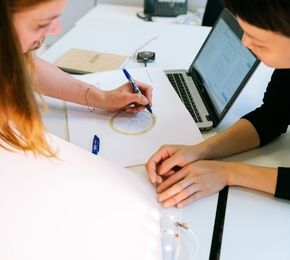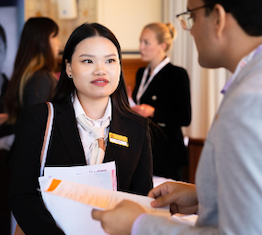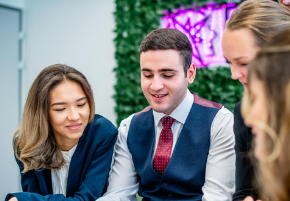- About
- Programs
- Innovation & Research
- Campus Life
- Career Services
- Admissions
- News & Events
- Alumni
First Job Interview Tips to Make a Great First Impression
Discover essential first job interview tips to boost your confidence, impress employers, and ace your interview with ease. Start preparing today!
How to Prepare For The First Job Interview
First job interviews can definitely feel like an overwhelming experience—you're excited, nervous, and eager to make a good impression all at once. While feeling anxious is okay to some degree, you should not let that feeling dominate you. With the proper preparation, you can enter the first job interview feeling confident and ready to showcase your best self without showing any anxiety.
Read on to learn all about the first job interview tips you need to know.
Research the company
The key to a successful interview is the preparation you must undergo beforehand. Before your interview, you must take some time to research the company thoroughly. Exploring their website will give you insights into their values, mission, and recent projects.
For example, if you're applying to a marketing company, check out their latest campaigns, read through their blog, and find any press releases or recent news. Mentioning specific campaigns or initiatives they've worked on shows you've done your homework and helps you connect your experience to their needs.
Interviewers can tell when a candidate hasn't done their homework. Understanding the company's goals and how your role fits them shows you are proactive and serious about the position.
Review the job description
Another thing you should do while preparing for your first job interview is to go over the job description again. Break it down and consider how your skills align with the responsibilities mentioned.
Let's say the job description mentions "strong project management skills." It would be best to mention an instance when you coordinated a group project in school or managed a project where you had to organize tasks, set deadlines, and ensure everything stayed on track.
You could say something like, "In my previous job, I led a team of five to meet a client deadline for a new website launch. We finished the project a week before schedule by creating a clear timeline and managing communications between departments. That gave us time to double-check everything and perfect it."
Practice common interview questions
Questions are inevitable during job interviews. That's why it is a great idea to prepare for common interview questions including but not limited to:
- What can you tell us about yourself?
- Why do you want to work here?
- What are your strengths and weaknesses?
But don't just stick to theory—think of real-life examples to back up your answers. It will make your responses more convincing and relatable.
Pro tip: When asked, "What's your biggest weakness?" instead of giving a generic answer like "I'm a perfectionist," share a personal growth story.
For instance, you could say, "In my first year of college, I struggled with time management because I took on too many extracurriculars. However, I learned to prioritize tasks using a project management tool, which helped me stay on top of my workload. Now, I set realistic goals and delegate when needed."
Practice a mock interview
Doing a mock interview with a friend or in front of a mirror helps calm those pre-interview jitters. It's one thing to have the answers in your head and another to say them out loud. If you don't have anyone to practice with, consider using online tools that simulate interviews and offer feedback on your performance.
Your Hospitality Journey Starts Here
Master the art of hospitality management
Practical example: Let's say you're interviewing for a sales position, and a common question is, "How would you handle a difficult client?" In your mock interview, you could role-play a situation where your "interviewer" acts as a frustrated customer, and you practice resolving their issue. This practice could give you insights into your answer during the actual interview.
Dress to impress
First impressions count. While dress codes vary by company, consider going for business casual or professional attire. If you're unsure, doing a little homework can help. You can do so by researching the company culture showcased on social media or the website. If you can't find the needed information, ask a career coach for guidance.
Avoid overly casual or distracting attire. For example, jeans, sneakers, or graphic tees may be appropriate for some creative or tech environments, but they can be too informal in most professional settings. Avoid anything too flashy or revealing, as it distracts your professionalism.
The key is to dress in a way that shows you respect the opportunity while fitting the company culture.
Body language matters
How you carry yourself during the interview is as important as what you wear or say. Sit up straight, offer a firm handshake (if applicable), make eye contact, and smile. Imagine you're at a meeting with a group of friends—that level of comfort and engagement can help you relax without appearing too casual.
If you're naturally fidgety, practice sitting still and making deliberate hand movements to avoid looking nervous. During the interview, lean in slightly when the interviewer speaks to show active listening.
If they ask a tricky question, take a moment, make eye contact, and smile before answering. It shows you're confident under pressure.
Be enthusiastic and confident
Nervousness is natural, but try to channel that energy into enthusiasm. Show the interviewer your excitement about the opportunity, but remain confident in your abilities. If you don't have direct experience in an area, focus on how your transferable skills make you a fast learner.
Let's say you're applying for an entry-level position at a hotel, and the interviewer asks about your experience with a specific reservation system you haven't used.
Instead of panicking, you could say, "I haven't worked with that particular system yet, but during my internship, I learned to use a different reservation software and picked it up quickly. I'm confident I can do the same here and ensure a smooth guest experience."
Listen carefully and answer questions thoughtfully
Sometimes, nerves can cause you to answer questions too quickly or without fully listening. Take your time to process the question before jumping in with an answer. If you need a moment to think, that's perfectly okay! Thoughtful responses show that you're attentive and deliberate.
If an interviewer asks you to describe a time when you overcame a challenge, don't rush. Pause, smile, and say, "That's a great question, let me think about that for a second."
Then, bring up a meaningful experience, such as managing a challenging group project in school where communication broke down, but you took the initiative to resolve the issue.
Ask thoughtful questions
Interviews are a two-way street. At the end of the interview, you'll likely be asked if you have any questions. This is your chance to learn more about the company and the role. Ask about the team dynamics, company culture, or what success in the position looks like.
Instead of asking generic questions like, "What's a typical day like here?" you could ask, "What do you think makes someone successful in this role?" or "How does this team handle tight deadlines?" Such questions show genuine interest and provide insights to help you decide if this role is the right fit for you.
Follow up with a thank-you note
After the interview, take the time to send a brief thank-you email to your interviewer. A sincere thank-you allows you to reiterate your enthusiasm for the position.
A short, personalized thank-you email could read: "Thank you so much for the opportunity to interview for the [position]. I really enjoyed learning more about the team and was particularly excited by your [upcoming goals]. I'm confident my background in [your field] would allow me to contribute meaningfully. Looking forward to hearing from you soon!"
Conclusion
Your first job interview can feel like a huge milestone, and it is! By preparing well, practicing, and bringing your authentic self into the room, you'll increase your chances of making a lasting, positive impression. Remember, the goal is not to be perfect but to show that you're capable, eager to learn, and ready to take on new challenges. Simply follow the above-mentioned tips for first job interviews, and you will be ready to impress.
Frequently Asked Questions (FAQs)
What are some things you should avoid saying during a job interview?
Avoid speaking negatively about previous employers or colleagues. For instance, instead of saying, "My last boss was terrible," focus on what you learned: "In my last role, I had to adapt to different management styles, and it taught me how to be flexible and communicative."
How do I handle tricky questions?
If you are asked a tricky question, don't panic. Stay calm and ask for a moment to think about your answer if needed. For example, if asked about a gap in your resume, you could say, "I took that time to focus on personal growth, and I'm now excited to bring those lessons into this new opportunity."
How should I prepare for virtual or online job interviews?
For virtual interviews, test your technology beforehand to ensure everything works smoothly. For example, check your internet connection, test your webcam, and make sure your audio is clear. Choose a quiet place to minimize interruptions, and treat the virtual interview as professionally as an in-person one.
Your Hospitality Journey Starts Here
Master the art of hospitality management
#Student Life

















